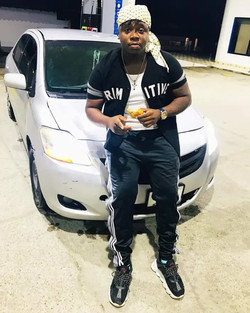The Triunfo de la Cruz region has been embroiled in a struggle to save their ancestral land from developers and drug traffickers
Nina Lakhani
A member of the Garifuna ethnic group takes part in a protest in front of the supreme court in Honduras. Photograph: Orlando Sierra/AFP/Getty Images
Fears are growing for the safety of five black indigenous men in Honduras who were abducted from their homes last weekend by heavily armed gunmen in police uniforms.
The victims are Garifuna fishermen from the town Triunfo de la Cruz on the north coast – a region where communities are embroiled in a longstanding struggle to save their ancestral land from drug traffickers, palm oil magnates and tourism developers aided by corrupt officials and institutions.
The Garifunas are descendants of an Afro-indigenous population from the Caribbean island of St Vincent, who were transported from their home by the British and abandoned on the Honduran coast in the late 18th century.
In Honduras, they and other indigenous communities have suffered decades of violent land grabs, which have been carried out with almost total impunity.
According to witnesses, armed men wearing balaclavas arrived in Triunfo de la Cruz around 5am on Sunday in three 4 x 4 vehicles. The perpetrators went house to house, and forced the five men into the vehicles at gunpoint, before speeding away – despite a supposed coronavirus curfew.
The vehicles did not have number plates – a tactic used by both state security forces and criminal gangs in Honduras.
Among those abducted was Alberth Snider Centeno Thomas, 27, president of the community board and a semi-professional footballer, who had previously reported threats linked to his role defending territorial rights. Also missing are Milton Joel Martínez Álvarez, 39, Suami Aparicio Mejía, 29, Junior Rafael Juarez Mejia, 33, and Mamba – a nickname, whose full name is yet to be confirmed.
Centeno, a father of four, has helped lead efforts to force the Honduran government to comply with a 2015 ruling from the Inter-American Court of Human Rights (IACHR), the highest civil court in the Americas, ordering Garifunas be compensated for stolen land and issued legally binding titles to prevent further forced evictions.No one has heard from the men since they were abducted, and authorities are yet to establish a motive, according to one senior prosecutor who asked not to be named.
“We are under constant threat by those who want our land and natural resources,” said Jenny Ramona Herrera Álvarez, a community spokeswoman in Triunfo de la Cruz. “We do not want our brothers to be just another murder statistic. They were taken alive, we want them back alive.”
On Wednesday, one alleged suspect was detained after a series of police raids, according to the attorney general’s office.
Miriam Miranda, a Garifuna leader from the Black Fraternal Organization of Honduras (Ofraneh) who herself has faced death threats, called for international pressure to ensure those who masterminded the crime – not just those who executed the abduction – face justice.
“What happened on Saturday shows that powerful people who have illegally taken control of our territory are emboldened by the state’s contempt for the international court ruling. Justice means prosecuting those who ordered this crime,” said Miranda.
Honduras became the most dangerous country in the world to defend natural resources and land rights after a 2009 coup ushered in an autocratic pro-business government – which remains in power despite multiple allegations of corruption, electoral fraud and links to international drug trafficking networks.
Since then, hundreds of defenders have been killed, and many others silenced as a result of trumped up criminal charges – a coordinated tactic between economic, political and judicial elites which has been condemned internationally.
The highest-profile victim was the indigenous defender Berta Cáceres, who was assassinated in March 2016 after suffering years of threats and harassment linked to her opposition to an internationally funded dam – one of hundreds of environmentally destructive megaprojects sanctioned by the post-coup regime.
The abduction of the five Garifuna men come just weeks after the murder of Antonio Bernárdez, 71, a Garifuna leader from the Punta Piedra community.
At least five Garifuna leaders have been killed since September 2019, according to the United Nations high commissioner for human rights (OHCHR) in Honduras.
“The Honduran state created the context for conflicts by violating the community’s territorial rights over years, and subsequently failed to comply with the IACHR order, which has aggravated conflicts,” said Joseph Berra, director of the human rights in Americas project at UCLA school of law. “The Honduran state is directly responsible for these aggressions against the Garifuna community.”














